Islamophobia
[20] Due to the racialized nature of Islamophobic discrimination and attacks suffered by numerous Muslims in their daily lives, several scholars have asserted that Islamophobia has explicit racist dimensions.It is attested in English as early as 1923[54] to quote the French word islamophobie, found in a thesis published by Alain Quellien in 1910 to describe "a prejudice against Islam that is widespread among the peoples of Western and Christian civilization".[60][58] In 2008, a workshop on 'Thinking Through Islamophobia' was held at the University of Leeds, organized by the Centre for Ethnicity and Racism Studies, the participants included S. Sayyid, Abdoolkarim Vakil, Liz Fekete, and Gabrielle Maranci among others.As with parallel concepts like homophobia or xenophobia, Islamophobia connotes a broader set of negative attitudes or emotions directed at individuals of groups because of perceived membership in a defined category.[69][failed verification] As opposed to being a psychological or individualistic phobia, according to professors of religion Peter Gottschalk and Gabriel Greenberg, "Islamophobia" connotes a social anxiety about Islam and Muslims.[98][99][100] The stereotyping of Bosniak Muslims as a hostile force threatening Europe with "terrorism" in Serbian propaganda was closely linked to the rise of Islamophobic narratives in Western media and European political discourse.[103] According to Benn and Jawad, The Runnymede Trust notes that anti-Muslim discourse is increasingly seen as respectable, providing examples on how hostility towards Islam and Muslims is accepted as normal, even among those who may actively challenge other prevalent forms of discrimination.[113] Christina Ho has warned against framing of such mainstreaming of gender equality in a colonial, paternal discourse, arguing that this may undermine minority women's ability to speak out about their concerns.[61] Cora Alexa Døving, a senior scientist at the Norwegian Center for Studies of the Holocaust and Religious Minorities, argues that there are significant similarities between Islamophobic discourse and European pre-Nazi antisemitism.[105] In a reply to Bunzl, French scholar of Jewish history, Esther Benbassa, agrees with him in that he draws a clear connection between modern hostile and essentializing sentiments towards Muslims and historical antisemitism.However, Schiffer and Wagner also note that there is a growing tendency to view Muslims as a privileged group that constitute an "internal threat" and that this convergence between the two discources makes "it more and more necessary to use findings from the study of anti-Semitism to analyse Islamophobia".[149] Silva and Meaux et al both theorized that one of the main causes of negative interactions, stigma, and marginalization toward the Arabic community is due to the fact that many media framing from news outlets tend to associate Arab-Muslims with terrorism and jihadist-inspired motivations when it came to mass violence incidents.[158][159][160] In August 2012 SIOA generated media publicity by sponsoring billboards in New York City Subway stations claiming there had been 19,250 terrorist attacks by Muslims since 9/11 and stating "it's not Islamophobia, it's Islamorealism.[162][163] In early January 2013 the Freedom Defense Initiative put up advertisements next to 228 clocks in 39 New York subway stations showing the 2001 attacks on the World Trade Center with a quote attributed to the 151st verse of chapter 3 of the Quran: "Soon shall we cast terror into the hearts of the unbelievers.Lavalette alleges that there is a continuity between the former two British governments over prevention that aims to stop young Muslim people from being misled, misdirected and recruited by extremists who exploit grievances for their own "jihadist" endeavors.[108] According to Benn and Jawad, Islamophobia has increased since Ayatollah Khomeini's 1989 fatwa inciting Muslims to attempt to murder Salman Rushdie, the author of The Satanic Verses, and since the 11 September attacks (in 2001).[188] He noted that each country has anti-Muslim political figures, citing Jean-Marie Le Pen in France; Pim Fortuyn in the Netherlands; and Philippe van der Sande of Vlaams Blok, a Flemish nationalist party in Belgium."[188] Similar fears, as noted by Kenan Malik in his book From Fatwa to Jihad, had been previously expressed in the UK by Muslim philosopher Shabbir Akhtar in 1989, and Massoud Shadjareh, chair of the Islamic Human Rights Commission in 2000."[189] Malik, a senior visiting fellow in the Department of Political, International and Policy Studies at the University of Surrey, has described these claims of a brewing holocaust as "hysterical to the point of delusion"; whereas Jews in Hitler's Germany were given the official designation of Untermenschen, and were subject to escalating legislation which diminished and ultimately removed their rights as citizens, Malik noted that in cases where "Muslims are singled out in Britain, it is often for privileged treatment" such as the 2005 legislation banning "incitement to religious hatred", the special funding Muslim organizations and bodies receive from local and national government, the special provisions made by workplaces, school and leisure centres for Muslims, and even suggestions by the Archbishop of Canterbury Rowan Williams and the former Lord Chief Justice, Lord Phillips, that sharia law should be introduced into Britain.The fact is, wrote Malik, that such well-respected public figures as Akhtar, Shadjareh and Yaqoob need "a history lesson about the real Holocaust reveals how warped the Muslim grievance culture has become."[190] In 2006 ABC News reported that "public views of Islam are one casualty of the post-September 11, 2001 conflict: Nearly six in 10 Americans think the religion is prone to violent extremism, nearly half regard it unfavourably, and a remarkable one in four admits to prejudicial feelings against Muslims and Arabs alike."Associate Professor Deepa Kumar writes that "Islamophobia is about politics rather than religion per se"[194] and that modern-day demonization of Arabs and Muslims by US politicians and others is racist and Islamophobic, and employed in support of what she describes as an unjust war.The author of the report said that "The hate that these groups are funding and inciting is having real consequences like attacks on mosques all over the country and new laws discriminating against Muslims in America.[216][217][218] According to Yvonne Haddad: The Islamophobia Industry in America is "driven by neocon stars: Daniel Pipes, Robert Spencer, David Yerushalmi, Glenn Beck, Pamela Gellner, Paul Wolfowitz, David Horowitz, and Frank Gaffney as well as native informers Walid Shoebat, Walid Phares, Wafa Sultan, Ayaan Hirsi Ali, Ibn Warraq, Brigitte Gabriel, Tawfik Hamid, and Zuhdi Jasser."[246] Following the San Bernardino attack in 2015, Donald Trump, then a candidate for President, proposed "a total and complete shutdown of Muslims entering the United States, until we can figure out what the hell is going on".[248][249] Trump's rhetoric was condemned by his opponent, Hillary Clinton, as well as numerous Muslim advocacy groups and activists, and became a focal issue in the 2016 United States presidential election.[263] The 2020 Delhi riots, which left more than 50 dead and hundreds injured,[264][265] were triggered by protests against a citizenship law seen by many critics as anti-Muslim and part of Prime Minister Narendra Modi's Hindu nationalist agenda.[275] On 26 September 2018, the European Parliament in Brussels launched the "Counter-Islamophobia Toolkit" (CIK), with the goal of combatting the growing Islamophobia across the EU and to be distributed to national governments and other policy makers, civil society and the media.[290] The classification of "closed" and "open" views set out in the Runnymede report has been criticized as an oversimplification of a complex issue by scholars like Chris Allen, Fred Halliday, and Kenan Malik."[7][299][300] In a 2011 paper in American Behavioral Scientist, Erik Bleich stated "there is no widely accepted definition of Islamophobia that permits systematic comparative and causal analysis", and advances "indiscriminate negative attitudes or emotions directed at Islam or Muslims" as a possible solution to this issue.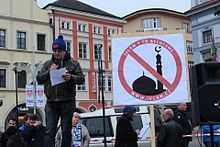


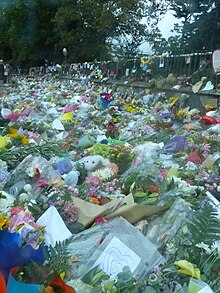



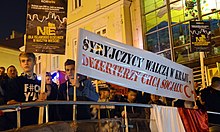

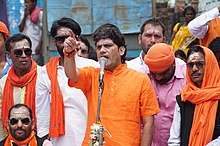




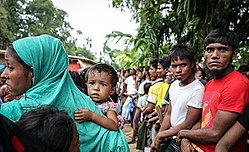

Persecution of MuslimsAnti–Middle Eastern sentimentTropesAirport profilingUnited StatesCounter-jihadEurabiaGreat ReplacementHalal-relatedLove jihadHijabophobiaNetherlandsFranceKarnataka, Indiaminority MuslimMuslim immigration bansOrientalismPersecutionQuran desecrationAustraliaAustriaBelgiumBosnia–HerzegovinaCanadaGermanyIcelandIsraelMyanmarNorwayPolandSwedenSwitzerlandUnited KingdomConservative PartyStereotypesAl-HidayaAl-NuraynBærumBabri MasjidBanya BashiBayonneBeit LahiaBloomingtonChristchurchCorsicaGondarHyderabadIbrahimKattankudyKosovoManiliMalegaon2009–10PalimbangQuebec CitySweden (2014)ZürichCalifornia (2001)SingaporeBosnianEthnic cleansingSrebrenicaChechen and IngushCrimean TatarsCircassianPacification of AlgeriaPalestinian genocide allegationRohingyaAbu Ghraib (2000s)Albanians (1912–13)Assam (2014)Ayyadieh (1191)Baghdad (1258)Big Excursion (1989)Bossemptélé (2014)Bukovica (1943)Beirut (1975)Boyo (2021)Cave of the Patriarchs (1994)Granada (1482–92)Gujarat (2002)Guangzhou (878–79)Harmanli (1878)İşkodra and Niş (1877–78)Jerusalem (1099)Karantina (1976)Kulen Vakuf (1941)Kafr Qasim (1956)Lasithi (1897)Mecca (600s)Moriscos (1609)Myanmar (2015)Nellie (1983)Northern Sri Lanka (1990)Norway (2011)Paris (1961)Sri Lanka (2018)Sabra and Shatila (1982)Šahovići (1924)Sétif and Guelma (1945)Shadian (1975)Sohmor (1984)Spain (1500–26)Walisongo (2000)Almondbury bullying incidentBendigo mosque protestsBulli Bai caseSulli DealsCAA, 2019Cronulla 2005Erklärung 2018Flying imams incidentJerry KleinHaridwar hate speechesHindutva popHoly TerrorInnocence of MuslimsJyllands-Posten cartoonsKathua rape caseMuslim Massacre (video game)Serbia StrongPersecution of Uyghurs in ChinaXinjiang internment campsSwiss minaret banTrojan Horse affairDocument.no